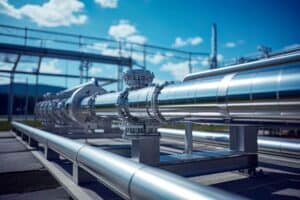Alberta Innovates is the province’s most comprehensive research and innovation agency with a total managed portfolio impact of $1.2 billion in value encompassing 1,320 active projects. They work across sectors to fund, partner and enable entrepreneurship throughout the province. Developing Alberta’s technology sector includes more than funding projects; another key role is acting as conveners to build clean energy partnerships in Alberta.
Vanessa White, director renewable and alternative energy at Alberta Innovates, presented at the 2022 CEPA Foundation Quality Summit to explain why Small Modular Reactors (SMRs) are transformative and the role they could play in advancing the energy transition.
We spoke with White to learn more. She explained that Alberta Innovates identified a need to develop the foundation for SMRs within the industry. “SMRs are an important piece of the toolkit that Alberta will need to develop in order to decarbonize the electrical grid and heavy industry, including the energy industry.”
What are SMRs?
The World Nuclear Association defines an SMR as one that can produce up to 300 MWe (up to 700 for medium modular reactors). Unlike large-scale reactors, of which there are almost 20 in Canada, they are manufactured in components that can be set up and connected on-site.
As we mentioned in our recent post ‘Quality systems in nuclear’, nuclear power is emissions-free, affordable and reliable, and is set to play an important role in helping reduce or even eliminate emissions. One of the major challenges for the industry is the high capital costs involved in set-up. SMRs represent a solution to that barrier.
“There is a significant value proposition in being able to manufacture components in a controlled environment compared to on-site construction,” said White. “The manufacturing process is set, there are no external conditions to be considered and there are economies of scale.”
Benefits of SMRs
Aside from the significant cost advantages, SMRs also have several other benefits that will make them an important technology:
-
- Water Usage. They use less water for cooling than large-scale reactors as many SMR designs don’t use water as the internal fluid that takes the heat away from the nuclear reactor.
- Safety. SMRs are already safer than any existing reactors as they are designed with inherent safety features that make a failure impossible. “Nuclear is already a very safe industry,” said White. “They have been operating safely for many decades, and SMRs can raise that bar even further.”
- Scaling. Where required, multiple SMRs can be deployed together in order to produce more energy.
Uses of SMRs
Aside from electricity, SMRs are also capable of producing heat which can be transferred to industrial processes. This provides huge decarbonization opportunities for heat intensive industries and those that currently use natural gas. The oil sands, petroleum refining, petrochemicals, cement manufacturing, potash mining, steel and automotive are just a few examples.
The smallest units (micro or MMRs) will also offer a solution to remote communities that rely on diesel being trucked or flown in for electricity generation and heat.
What’s next?
“It will be important for us to address questions and concerns that the public and indigenous communities have around nuclear,” said White. “Then we must lay the foundation for what a nuclear solution could look like for individual operations, and develop relationships between industrial communities and nuclear operators in other provinces.”
Progress towards the deployment of SMRs in Alberta could occur within the next decade or so.
In the bid to decarbonize heavy industry and the electrical grid, SMRs will play an important role. Alberta Innovates is working hard to ensure that the province of Alberta is prepared to participate effectively in this developing industry.




